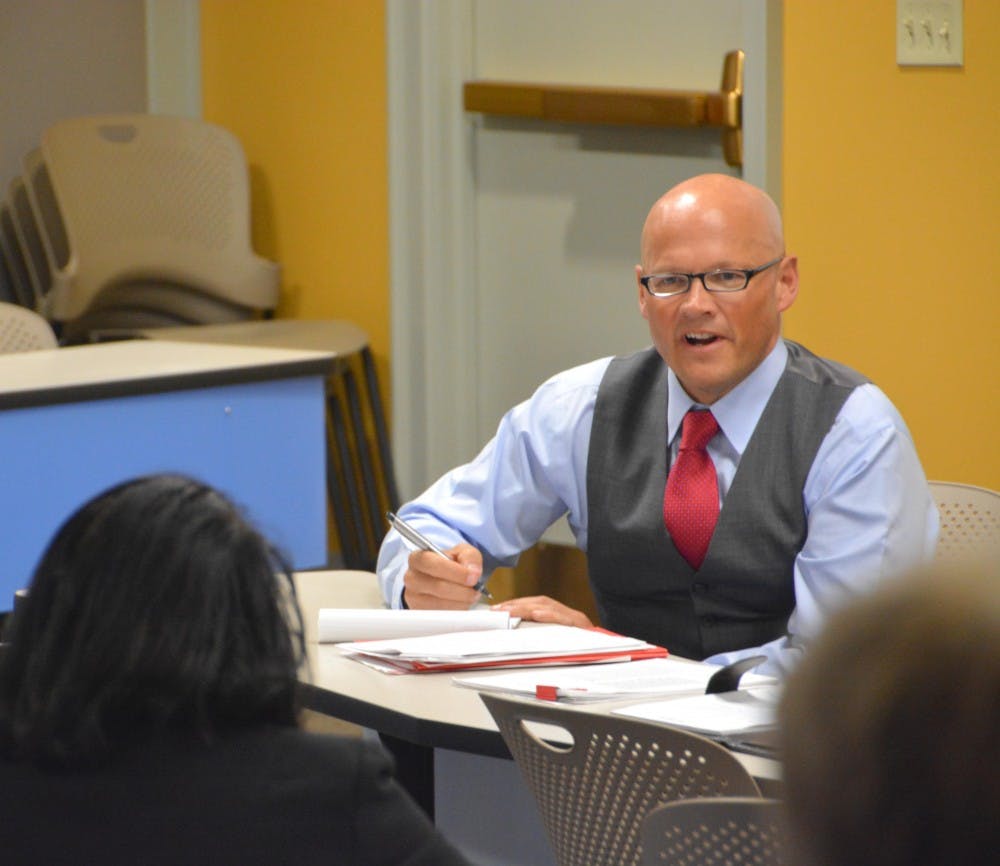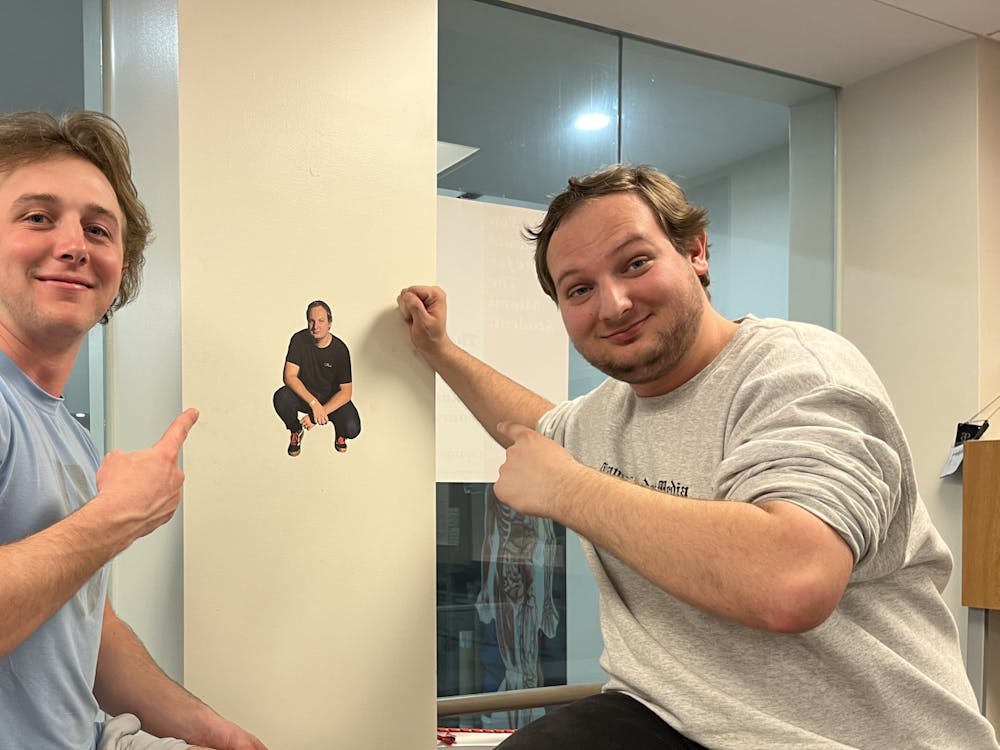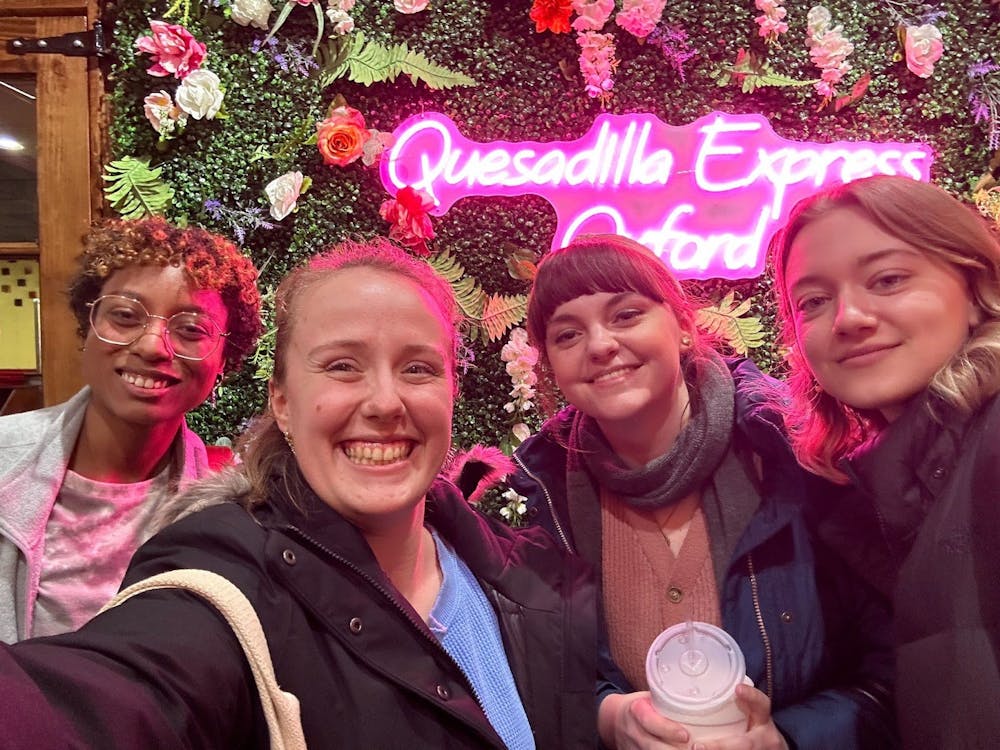The Student's exclusive conversation with Miami's 22nd president
By James Steinbauer and Emily Williams, The Miami Student
On Oct. 10, Gregory Crawford and a cadre of students, faculty and staff will march from the Hub to Millett Hall, where he will be officially inaugurated as Miami University's 22nd president.
During the ceremony, Crawford is expected to give an inaugural address, laying out his platform and goals for his time as president. Based on his letters to the Miami community (which can be found here and here), blog posts and his convocation remarks, it's safe to say that shared governance, transparency, a commitment to undergraduate research and, especially, diversity will be at the top of Crawford's list.
In his first blog post on August 11, Crawford wrote that his fervent hope for Miami is that "we progress towards a model of inclusive excellence" and "become a model of how to organize our community to reflect a healthy society." The Miami Student wanted to know more about what that meant and how he planned to achieve those lofty goals during his time at Miami.
We spoke with Crawford over two, hour-long interviews last month, armed with questions -- both our own and ones sourced from the Miami community -- on shared governance, adjunct and part-time faculty, diversity, Greek life and sexual assault, among other things. Our goal was to draw out deeper, more personal explanations on where he stands in regard to the issues students and faculty at Miami care about most.
Our first impression is that this president is full of enthusiasm for his new home. He already talks of the Miami community as "we," and "love and honor" is now a regular part of his vocabulary. He has a lot of goals for his time here.
He also has a lot to learn. The question now is whether he can use that energy to create actual change. The most controversial thing this president can do is nothing.
Here is what he had to say:
On tenure-track faculty and the teacher-scholar model
The Miami Student
Enjoy what you're reading?
Signup for our newsletter
At colleges and universities throughout the United States, academia are worried about the steady decline of tenure-track faculty positions and the effects this decline will have on the quality of education. In a series of articles last year (which can be found here and here), The Miami Student showed that Miami University is not immune to this trend.
Do you have any plans to increase the level of tenure-track faculty and what can be done to give current temporary faculty a path to the tenure track or permanent employment?
Gregory Crawford
We are always looking to increase the numbers of full time faculty and the proportion of those who are tenure line, within the constraints of available resources. The Provost has established that as one of her priorities since her appointment and she has the support of all the deans. This year, alone, we expect to conduct over 50 searches for tenure line faculty.
All of the tenure line faculty employment searches are nationally advertised, open and inclusive and current temporary faculty are welcome to apply. While faculty searches are supported by the deans and approved by the provost, positions are identified and described and the searches are conducted by the academic department, which reviews the qualifications of applicants and makes recommendations to the department chair and to the dean.
The Miami Student
You've previously stated that you are in support of increasing undergraduate and faculty research at Miami. Unlike Notre Dame, Miami is not seen as a big research institution, so why do you feel research is important?
Gregory Crawford
I really resonate with the teacher-scholar model, where our faculty are the very best in teaching while also very engaged in research.
There are two major areas, among many, where I think research is important. First, it advances the truth and moves society forward. Research can be of the purest form, with no practical applications immediately in sight but it helps us understand our world more fully. This is especially true of the humanities and the arts, for example. In some fields, the applications of our increased knowledge may not be clear for years or even decades, but the research outcomes bring greater depth of understanding to our history, our cultures and other aspects of our world. It can also be more applied and be used more directly to solve a social or human health problem in a way that advances the well being of individuals and society. Both of these are important in the big picture.
I think the nature of some of our societal problems, they're just hard to understand. And people are looking at universities to solve them. These are not things that one company can solve. It takes more people to attack this. We can bring together humanists, chemists, economists, and we can put together a university team with deep expertise in all kind of areas and solve problems that not a single person or single discipline can solve. It takes a whole team to do it. The liberal arts are going to be huge in finding solutions to today's big problem, many of which involve humans.
The Miami Student
The provost and College of Arts and Science dean have both expressed their interest in reducing the number of temporary faculty. But if temporary faculty are to be reduced, under current circumstances, it is likely that the permanent faculty's teaching loads will increase. This will mean that permanent faculty will have less time for research. How will you deal with that tension?
Gregory Crawford
I don't see this really playing out that way or being a problem, to be honest. We're currently looking more holistically at this matter, assessing our curricular offerings to ensure we use our resources wisely. We are not looking to increase teaching loads by our full time faculty, nor are we looking to take away time from research. The provost and all of the deans value the research mission and understand its importance. We continue to provide research leaves and travel funds to support the research endeavors of our faculty.
On the importance of domestic diversity and inclusivity
The Miami Student
Last month, the university received a report from EducationCounsel, an education consulting firm which interviewed about 200 Miami community members in April about their experiences related to diversity and inclusion at Miami. The report pointed out specific concerns at the university related to diversity including a lack of a common understanding of Miami's diversity and inclusion goals and feelings of anger, disappointment or distrust toward the university's handling of diversity and inclusion concerns. Why is it important for the university to do better?
Gregory Crawford
I think that diversity enhances learning, broadens horizons and minds, shapes our experiences, builds community, and provides important perspectives. Living and studying in a diverse environment provides critical preparation for the world of the 21st century. Our diversity has increased this year for our incoming students by about two percentage points, from 13.7 percent to 15.7.
Oftentimes, we don't necessarily look at students as drivers of perspective. Our graduates will live and work in a diverse environment that is unprecedented in history. They will, for example, see the United States become a majority-minority country where no single group is more than half of the population. Diversity and inclusion provide rich opportunities for creativity, innovation and synthesis as we work to solve global challenges.
The Miami Student
There were a number of incidents last year regarding homophobic language and racial slurs by students in the residence halls and Uptown. How can Miami better support students of color and LGBTQ students on Miami's campus so that they feel safe to engage in the community?
Gregory Crawford
I am fully committed to building upon our welcoming environment here at Miami. In order to build a more inclusive environment, we must also focus on our majority students, who through their attitudes, behaviors and words can affect whether everyone feels they belong at Miami. Many students have not given much thought to the power they have to make Miami the most welcoming place possible through their daily interactions. Words matter. My words matter. Everyone's words matter. We need to watch what we say and how we say it. Intolerance, prejudice and every other expression of division weaken us as individuals, as a community and as a university.
I've talked to many students in the past several weeks, and I believe we have a generous, open student body. If we were more reflective, we could all help contribute to a positive campus culture in small ways every day. At the end of the day, it's our collective responsibility to reach out, to listen, to support and embrace differences. I will continue to talk about the importance of being an accepting and welcoming community.
The Miami Student
According to the EducationCounsel report, other universities have strengthened their domestic diversity through increased scholarship opportunities for students who demonstrate financial need. How will the university ensure that funds for critical financial need scholarships that will help ensure domestic diversity at Miami be properly allocated?
Gregory Crawford
We are committed to increasing our scholarships for incoming students, and in particular need-based students. This year, we allocated more than $1 million in additional need-based aid for Ohio students in the incoming first-year class. I'm really committed to work on fundraising in the future. We'll continue to make need-based scholarships a priority in our next campaign to ensure domestic diversity.
On sexual assault
The Miami Student
Last month, The Student reported on the results from Miami's Annual Climate Survey, and over a quarter of female undergraduates at Miami's Oxford campus have experienced rape -- which is about on par with the national average among female undergraduates. In addition, almost six percent of male undergraduates in Oxford reported that they have experienced sexual assault. Do you see sexual assault as a problem on Miami's campus?
Gregory Crawford
One sexual assault is one too many. Our goal will always be to eliminate sexual violence in our community. Sexual assault and interpersonal violence are 100 percent unacceptable. It's not just Miami, it's everywhere. And it has to stop.
Nothing can take away the pain of these experiences, but I do believe that acknowledging that these incidents occur and removing the secrecy and shame that has long been put on those who experience sexual violence goes a long way in helping them know that they are cared about and will be supported.
People often look at me as the president only, but I am also a dad of two daughters. I have deep empathy for the victims of sexual assault and their families and friends who are often profoundly affected. We have to encourage more reporting. We have to make sure people are safe and educate people to be stewards of students as well.
The Miami Student
If one sexual assault is too many -- less than two months into the semester, at least two assaults have been reported by Oxford undergraduates -- Miami still has significant progress to make that goes beyond compliance with the national expectations for public educational institutions. What can Miami's administration do to better support victims of sexual assault and educate the students and faculty on sexual assault prevention?
Gregory Crawford
Compliance has never been our motivator in addressing sexual violence. Miami does this work because it is the right thing to do. The university has been working on these issues for decades, but the national conversations enabled us to more easily compare our work with best practices at other schools, giving us more guidance on how to improve our policies and practices, and bringing more attention to this issue.
Miami is in the process of hiring a new staff member whose sole responsibility will be to serve as the outreach coordinator for sexual assault and interpersonal violence initiatives. This person will lead our efforts to educate students, faculty and staff on all of our campuses about sexual assault and interpersonal violence. This will allow our coordinator for sexual assault response more time to work with students while dedicating more resources to education.
Miami has also partnered with Women Helping Women to have office hours on campus this year, expanding student access to confidential reporting resources and has trained student counselors available to offer confidential support. We need to look more at this confidential support. Even if someone doesn't want to go to the police, that doesn't mean they don't need help. I'd like to see more participation in something like that.
The Miami Student
The 2015 documentary "The Hunting Ground" prominently featured the case of Lizzy Seeberg, a student who committed suicide in 2010 after reporting that a Notre Dame football player had raped her. The film's findings prompted an investigation by the U.S. Department of Education's Office for Civil Rights for possible Title IX violations related to sexual violence on campus, despite the university's statements that the claims made in the film were inaccurate. In May 2015, The Miami Student reported on the experience of a female student who was raped during her first year at Miami in 2011. That student later brought a lawsuit against Miami University for negligence. Few universities can claim to have a pristine record when it comes to handling sexual assault cases. How do you intend to make Miami a model for the best practices?
Gregory Crawford
Sexual assault cases are extremely difficult and painful. Each one is completely unique. There are many cases that are unreported, others where students want support but don't want to pursue any action against the perpetrator, cases that go through our conduct process, and cases that go through the legal system. Some are reported immediately, and other months or years later. There is often little or no evidence, there are rarely witnesses, and in many cases, alcohol or drug use complicates the recall of details. It is impossible to understand how difficult these cases are for all involved unless you are involved in one, as a victim, the accused, a witness or a member of a conduct board.
I want people to be able to imitate us. I do think that we can be model for this. We have students that want to be supportive and bring change which we need to support.
Sexual assault is a direct attack on an individual and our whole community. Despite the difficulties and complexities in every case, Miami works to get it right for the sake of all involved.
On Greek Life
The Miami Student
You're coming from Notre Dame where there are no social fraternities or sororities. At Miami, there are currently 23 recognized chapters in the Interfraternity Council, 5 chapters in the National Pan-Hellenic Council and 18 chapters in the Panhellenic Council. What difficulties do you think you will have transitioning to a school where Greek students make up about a third of the student population?
Gregory Crawford
That is a fair observation, although I spent a longer time at Brown University, which had a Greek system. I do need to better understand the Greek system at Miami, as it differs from one institution to the next. Renate and I are going one by one to each of the chapters as a part of the listening tour. At a meeting with all the Greek leaders, I gave a talk on character and servant leadership and community outreach. I focused in on those three very positive attributes of the Greek system.
Although the Greek system has strong enrollment at Miami, there are far more non-Greek students than Greek.
On an editorially independent college newspaper
The Miami Student
We had to ask. To you, is a student newspaper, editorially independent from university administration, necessary?
Gregory Crawford
Having an independent paper like this on campus provides an extraordinary opportunity and perspective. It also comes with a responsibility to students. To be most effective, it must exemplify the highest journalistic integrity.
And independent paper can be in a position of extreme importance for facilitating constructive dialogue, for ensuring that students know the resources and opportunities available to them, for helping them grapple with issues and form their own conclusions. There is an opportunity to build campus unity and awareness through accurate reporting that conveys and analyzes the complex and multiple facts of a story. High-quality journalism can be a model of investigation with integrity, evidence-based conclusions and civil, open, respectful discourse.
An independent student newspaper provides a wonderful learning and training experience for our students -- the pursuit of the truth and to reflect that with integrity in a bias-free way, and also with the integrity that, when one misses a fact, to have the courage to make a correction and the humility to accept it. This is the way one learns and the newspaper provides that experiential learning.




